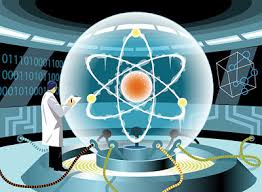
The massive amount of processing power generated by computer
manufacturers has not yet been able to quench our thirst for speed and
computing capacity. In 1947, American computer engineer
Howard Aiken said that just six electronic digital
computers
would satisfy the computing needs of the United States. Others have
made similar errant predictions about the amount of computing power that
would support our growing technological needs. Of course, Aiken didn't
count on the large amounts of data generated by scientific research, the
proliferation of
personal computers or the emergence of the
Internet, which have only fueled our need for more, more and more computing power.
Will we ever have the amount of computing power we need or want? If, as
Moore's Law states, the number of transistors on a
microprocessor
continues to double every 18 months, the year 2020 or 2030 will find
the circuits on a microprocessor measured on an atomic scale. And the
logical next step will be to create
quantum computers, which will harness the power of atoms and molecules to perform
memory
and processing tasks. Quantum computers have the potential to perform
certain calculations significantly faster than any silicon-based
computer.
Scientists have already built basic quantum computers
that can perform certain calculations; but a practical quantum computer
is still years away. In this article, you'll learn what a quantum
computer is and just what it'll be used for in the next era of
computing.
You don't have to go back too far to find the origins
of quantum computing. While computers have been around for the majority
of the 20th century, quantum computing was first theorized less than 30
years ago, by a physicist at the
Argonne National Laboratory.
Paul Benioff
is credited with first applying quantum theory to computers in 1981.
Benioff theorized about creating a quantum Turing machine. Most digital
computers, like the one you are using to read this article, are based on
the
Turing Theory. Learn what this is in the next section.
source:http://www.howstuffworks.com/quantum-computer.htm